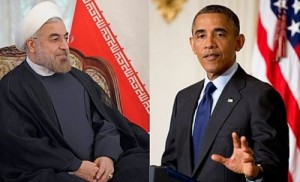 The talks between Iran and the �P5+1� countries last week bring to mind Winston Churchill�s 1942 description of World War II: �It is not even the beginning of the end. But it is, perhaps, the end of the beginning.�
The talks between Iran and the �P5+1� countries last week bring to mind Winston Churchill�s 1942 description of World War II: �It is not even the beginning of the end. But it is, perhaps, the end of the beginning.�This characterization is even more profound than it first appears. Today we are witnessing a roll of the dice throughout the Middle East. The �negotiations� over Iran�s nuclear program betoken a major shift in psychology and perceptions, notably about power, influence, and national interests. They involve the United States and almost all other countries in the region, which for so long have assumed the immutability of the Iranian-Western confrontation. Of course, that confrontation could now begin to crumble, with wide-ranging geopolitical implications in the region and beyond.
Most immediately, the talks appear to be getting down to brass tacks regarding what Iran is doing with its nuclear program; what it will do to reassure the world that it will not acquire a nuclear weapon or even move toward what is called a �breakout capability;� and what the United States and others will do in exchange. �In exchange� involves the sanctions that have been progressively imposed on Iran since the Islamic Republic�s birth in 1979. But it could also include other steps, some tangible, some intangible, whereby Iran would be readmitted as a legitimate state in international society, free from the shackles on its potential as a highly educated and creative nation with the most American-friendly population in the region.
So much of what will happen now involves the technical details of Iran�s nuclear program, which only a handful of people, both in Iran and the West, really understand.
More important, however, is the politics. Will the Iranian government move far enough to embrace a deal acceptable to the US and the other P5+1 members (the U.S., Britain, France, China, and Russia plus Germany)? Will the P5+1 accept that Iran does have the right to a peaceful nuclear program and some level of uranium enrichment? And, if there is a meeting of the minds, can a potential deal be sold to Iran�s Supreme Leader and the multiple constituencies in the West that claim the right to be heard?
The answer to the first part of this last question may depend on the will of a single individual (and his own complex politics). The answer to the second part will depend not just on President Barack Obama and the other P5+1 leaders � but also on the US Congress and especially Israel. US allies and partners lining the Persian Gulf and outliers like Turkey must also be satisfied.
If a potential deal does take shape, a titanic struggle will take place in this country, pitting President Obama against those who would oppose virtually any deal, however reasonable by objective standards, measured in terms of US national interests. Those parts of Congress responsive to Israel�s perspective will be joined in opposition by the �Friends of Saudi Arabia� and other regional oil countries. Silently in the corner will be the Western companies that pour advanced weaponry into the Arab States of the Persian Gulf � although, if the US does take pressure off Iran, arms sales to still-anxious countries could even increase.
But far more is at stake in the Middle East than Iran�s nuclear program and creating barriers against its ability to build a bomb. We are seeing the first break in the solid containment wall that was erected at the end of the 1970s due to fears that an Islamic revolution would spread its contagion. Except in a few places, that did not happen. Indeed, the greater threat both to Western interests and to regional countries now comes from al-Qaeda and its ilk (which, unlike Shia Iran, are Sunni).
In recent years, concerns have focused on Tehran�s nuclear program. But even before that, there was a policy of containing Iran, in many ways reflecting a general regional contest for power and influence. This contest reflected worries that Tehran and Washington might one day be reconciled. It is perhaps the best explanation for the (opaque) reasoning behind Saudi Arabia�s first campaigning for a seat on the UN Security Council (UNSC) and then, when successful, abruptly declining it. Indeed, with a break in the diplomatic barrier to Iran, Saudi Arabia is less sure that it will continue to stand higher in US regard than an Iran that is �behaving itself� � thus its recent antics. Ironically, the Saudi�s initial pursuit of the UNSC seat had always seemed strange: Security Council members are expected to set and follow standards that are alien to Riyadh.
For its part, Israel is competing for regional influence and to preserve, unchallenged, all the primacy it has in the US. It has effectively used the legitimate fears of an Iranian bomb to oppose any reconciliation between Washington and Tehran while positioning itself as America�s only friend there. This gambit was always risky; should the US and Iran come to terms on the nuclear issue and unfreeze other aspects of their relations, Iran could again become a �player� for influence, at least in the Middle East, with Israel and the oil-producing Arab states.
What happened in Geneva last week, therefore, is only �Act Two� of a lengthy play with elements of a psychological drama (�Act One� was the Obama-Rouhani phone call). But if Iran plays its part (by no means certain); and if � assuming that a reasonable nuclear deal can be struck � President Obama shows the mettle with domestic naysayers that he showed on debt and default, then major, positive developments may become possible in the Middle East for the first time in years.
By Lobe Log
The Iran Project is not responsible for the content of quoted articles.










